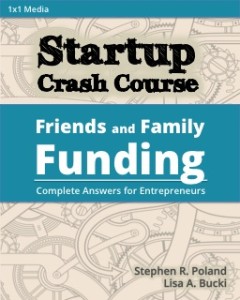Recently I let my group of close friends know that I had published my first eBook for entrepreneurs—Startup Crash Course: Angel Funding—and mentioned the next planned book about friends and family funding.
One friend immediately sent me a message saying: “I wish your next book was done. I’m about to pull the trigger on investing in a friend’s startup and would love some advice.” We’re now working together to identify the best structure for everyone involved in the deal. Sorting through the various funding options for founders and investors alike can be especially tricky, because you’re putting both your dollars and your relationship on the line.
Aside from personal savings or income from the founders, friends and family (shortened to just F&F for this post) funding is one of the most common sources of early capital for a startup company. F&F folks often invest to place a vote of confidence in the entrepreneur, wanting to help in getting the entrepreneur’s new venture off the ground. Many startups need a relatively small amount of money to reach early, yet critical, milestones. The early investment need may range from a few thousand dollars to $20,000, or somewhat more. Scraping together these amounts from “well positioned” F&F is often the best and only financing option for entrepreneurs to fund initial tasks such as forming the business structure, developing the product, and landing some early customers. Only after those steps have been achieved do other funding options such as angel capital or low-interest economic development loans start to become viable.
There are five common deal structures for F&F funding:
Future blog posts will introduce you to each of those deal structures, but for now I need to get one thing out of the way up front. When you’re considering raising startup money from family and friends, always keep The First Rule of F&F Funding in mind:
“Don’t take their money if they can’t afford to lose it”
If you are not sure of your F&F investor’s financial status, move on and don’t take that person’s money. Better to look for other resources now and make sure everyone stays on good terms later.
Be on the lookout for 1×1 Media’s next title, Startup Crash Course: Friends and Family Funding, as well as future blog posts about F&F funding and other topics.

